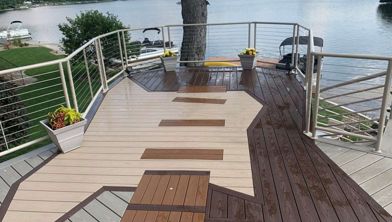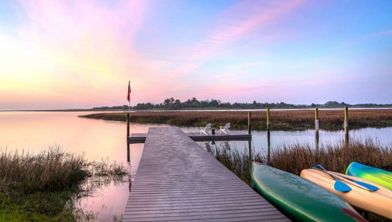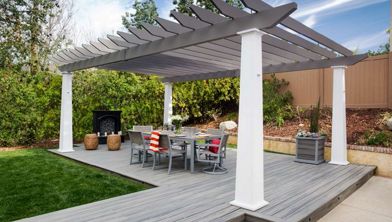9 Freestanding Deck Plans & Ideas
Explore our guide below for pros, cons, and design ideas for freestanding decks.
Looking to build a freestanding deck, but not sure where to get started? The beauty of freestanding deck designs is that they offer a wide range of possibilities — allowing you to create a one-of-a-kind structure anywhere in your outdoor space.
These flexible decks don't rely on your house to bear their load, which means you have the freedom to place them near your home, in the back corner of your yard, as part of a multi-level deck, or wherever best suits your deck plan.
We've curated some of our favorite freestanding deck ideas to help you get inspired and create freestanding deck plans of your own.
What is a Freestanding Deck?
A freestanding deck, also known as a floating deck, is a standalone deck that transfers its load directly to the ground rather than relying on your home for support.
One of the benefits of freestanding decks is that standalone deck ideas can be modified to suit your yard and your outdoor style dreams. Freestanding decks are a great idea if you:
- Do not have a building nearby to attach your deck to.
- Want to build a deck at the edge of a pool.
- Are building a deck next to a house where the siding or covering of the house is not easily attached to (ex: stucco, rock facade).
- Do not want to cut into the side of the house or structure next to your deck. This can help avoid moisture-related issues related to flashing failures/installation issues.
- Want to build a covered, enclosed, or large deck.
Freestanding Deck Pros
While freestanding decks are a good option for the reasons listed above, they also give you more creative freedom when designing your outdoor space. Here are a few of our favorite ways a freestanding deck allows navigate some of the design restrictions of a traditional deck:
- Flexibility: Freestanding decks can be built anywhere in your outdoor space. Even if you're looking to create the illusion of a connected deck, you can place a freestanding deck just a few inches from your house — with space left to ensure proper airflow.
- Placement: As they aren’t attached to your home, freestanding decks don’t need to be lined up with entrances or built on difficult or uneven ground directly beside your property.
- Elevation: Freestanding decks can be built at any elevation, which makes this style of deck useful for creating multi-level decks. Just keep in mind that decks built on uneven gradients or tall deck designs are sometimes more difficult to build and often have more code requirements.
Freestanding Deck Cons
Although freestanding decks are a brilliant choice for many people who want more outdoor space, there are some cons to stand-alone decks:
- More support needs: Usually, freestanding decks require more footings than decks attached to the house.
- Required bracing: As they aren’t attached to the solid wall of a building, cross bracing and diagonal bracing are needed to keep freestanding decks from swaying and being damaged in high winds and storms.
- Less impact on home value: Traditional decks are known to increase retail value, but there are fewer stats available about the effect freestanding decks have on home prices.
9 Freestanding Deck Ideas
Now you understand what a freestanding deck is and why you might choose one, take a look at Trex’s top freestanding deck design ideas:
1. Stand-alone Decks with a Pergola
If you’re building a freestanding deck to create the feeling of multiple backyard spaces or “outdoor rooms,” then giving your deck a frame and covering with an outdoor pergola will add to your design.
Pergolas can add architectural interest by highlighting your personal style wherever you build your stand-alone structure. They also make your new space more practical by offering shade cover so you can enjoy the backyard even when the sun isn’t letting up.
2. DIY Freestanding Deck Ideas
Freestanding decks can be a really good DIY project no matter your skill level. A low, single-level freestanding deck doesn’t require deep footings and can be built on any flat part of your yard.
If you’re looking for a more challenging self-build deck design, you might be able to grow practical yard space and take advantage of a good view by building above an awkward slope or adding a deck beside an existing body of water like a stream, river, or pond.
3. Contemporary Freestanding Deck Ideas
Freestanding decks with either no railings, glass railings, or aluminum railings have a contemporary look. Connecting your freestanding deck to your home, traditional backyard deck, or your patio with a raised path built from the same decking boards as the deck is also a good way to create a sleek, creative backyard look.
If you want something truly special, why not use recessed lights and strategically placed greenery to make your deck feel genuinely yours and contemporary?
4. Freestanding Deck Ideas on a Budget
Freestanding decks can save you money by allowing you to build wherever makes the most sense within your backyard. Any easy-to-build-on, flat area of land can be made both practical and beautiful with the addition of a simple, low freestanding rectangular deck.
Making a budget stand-alone deck look a million dollars isn’t hard either – planting carefully around the deck and choosing hard-wearing, attractive outdoor furniture guarantee your low-cost deck will impress. To create an accurate freestanding deck budget, try using the Trex Cost Calculator tool for an estimate for your project's material costs.
5. Adding a Fence to a Standalone Deck
If you want a private, enclosed space, then consider adding fencing to your stand-alone deck. An enclosed freestanding deck offers an area to socialize, sunbathe, or create a magical secret garden within your own backyard!
Trex offers composite fencing in a wide variety of colors and styles to match or complement your deck boards, and it won’t fade when exposed to sun or rain as wood does.
6. Adding an Outdoor Kitchen to a Freestanding Deck
An outdoor kitchen housed on a freestanding deck is a stylish, unexpected option. A bar and grill provides a separate entertaining space that screams “special occasion,” and it also means any late-night socializing noise can be carefully placed to avoid waking the kids or the neighbors.
7. Outdoor Furniture Ideas to Add to a Standalone Deck
Just like with any deck, a freestanding deck can be made into something really special with the right outdoor furniture. In fact, as your stand-alone deck is likely to be separate from your inside space and any existing traditional deck, it’s an opportunity to experiment with the bold decor decisions you’ve always dreamed of.
8. Fire Pit Freestanding Deck Ideas
Fire pits and fire pit tables can also add to a freestanding deck’s aesthetic appeal. A toasty warm fire pit makes your new deck usable even when it’s cold outside and also offers a fun focal point on warmer nights.
Plus, while sitting around a fire may be something people have done since the dawn of time, fire pit designs range from traditional to super clean and modern, so you don’t have to compromise when choosing a fire pit that fits with your backyard style.
9. Gazebo Standalone Deck Ideas
Similar to a pergola, a gazebo built on a freestanding deck adds structure and increases the feeling of multiple outdoor rooms that can be used for specific purposes. With a full roof or covering coming as a standard element of a gazebo, you can build yourself a space that’s close to weatherproof (particularly if you combine a gazebo and a fire pit).
Whether you’re after a summer house or a winter hideaway, a gazebo that tops a carefully placed stand-alone deck may be the answer.
Get Started With Designing Your Freestanding Deck Today!
Are you already imagining how a freestanding deck would look in your yard? Then it’s time to start on the next steps! You can take a look at Deck Plans for some inspiration before you make any major decisions, or use the Deck Designer tool to play with specific ideas that fit your backyard. Whether you’re planning to DIY your stand-alone deck or hire a professional to build your new outdoor space, knowing exactly what you want will save you time and help ensure your ideas become a reality.
This content was partially or fully generated by AI and has been reviewed by our team to ensure accuracy and relevance.







































